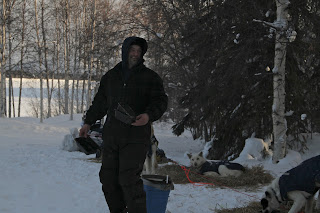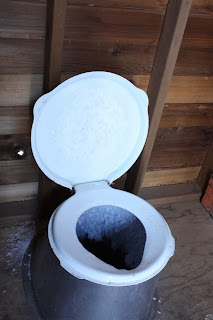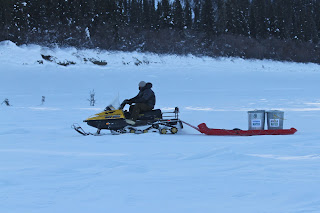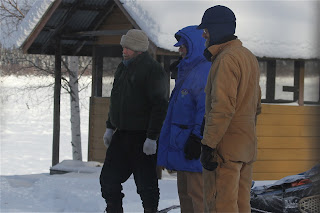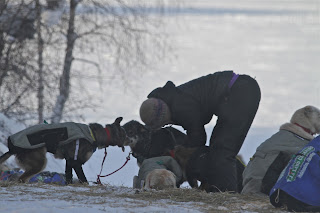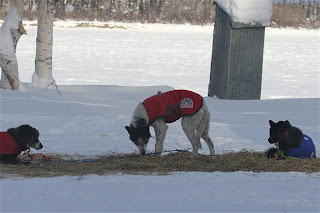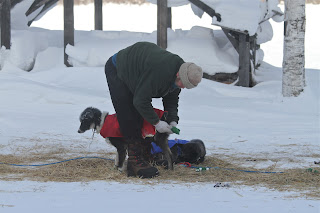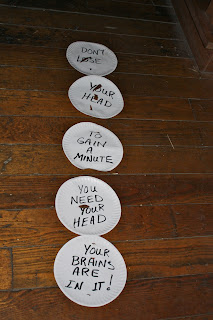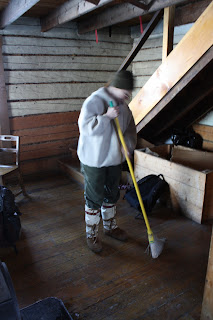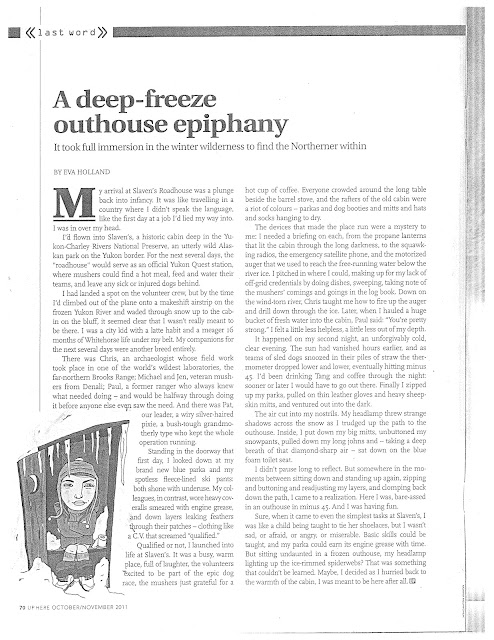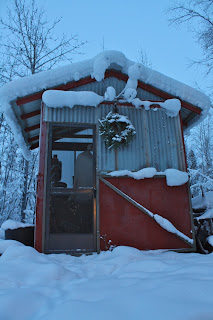The group of mushers that came in last night have been sleeping, and are waking up this morning to get ready to go.
During the night the last musher on the trail comes in, Canadian Hank DeBruin. He wants to sleep a while, so he will be a strong contender for the red lantern award.
The crew whispers among themselves about concerns for a couple of the mushers that are getting ready to leave. “Could someone check her feet, she’s walking around like they hurt,” “will you look at those boots he’s wearing, they aren’t warm enough,” “he may run out of food before he gets to Circle.” Despite the fact that they are all moving slowly this morning, they all are prepared to go out there again, and no one dropped any dogs. (The dogs are all in good shape; it’s some of the mushers that worry us.)
Pat asks Jerry Joinson if he’d like sausage, bacon or ham with breakfast. His reply is “yes.” In this bitterly cold weather, people need thousands of calories each day for their bodies to stay warm enough to function. This will be their last chance to fill up with a good hot meal today, and every one of them knows it. Slaven’s is one of the mushers’ favorite stateside respites, since most of the stops from here on out don’t have a quiet, comfortable place to sleep and this caliber of food service.
Young Kyla Durham, who is my daughter’s age, is one of the youngest rookies this year. She looks like any other fun loving girl on the outside, but has a stalwart iron core. She and Jerry Joinson have a discussion about sleep deprivation as they gear up to go take care of the dogs this morning. “I was starting to see things that aren’t there,” Durham says. “I thought I saw lights ahead a few times, but it was just the glistening snow.” She laughs as she recalls a story about another musher she knows that lives up north. “He wears a parka with a big white wolf ruff. He dozed off for a minute, and when he woke up he freaked out because he thought he was being attacked by a polar bear!”
Kyla heads outside to tend to her furry buddies. Pat makes a joke to Joinson about whether this Kyla or another young Kyla that they know cusses more. The 55 year old Canadian rookie (Joinson) laughs and says “Yeah, but that girl’s (Durham) got more heart…Whenever I think things are bad, I just say, if she can do it, so can I!”
Pat briefs everyone on what has transpired with the front runners, and congratulates them on all being “in the money” because the top 15 finishers are all guaranteed a cash prize, and at this point, there are only 15 mushers left in the race. Kyla responds, “I didn’t want to win anything like that, I just want to pass somebody.” Good for you Kyla, we hope you get to do that!
Tamara Rose departs Slaven’s at 7:21 am, followed by Johannes Rygh at 8:40, Jerry Joinson at 8:45, and finally Kyla Durham at 9:15.
This is the day we were originally supposed to go back home, but the cold weather will alter those plans. As we wait to hear from the pilot in Fairbanks, and look at the digital thermometer in the window, everyone pretty much already knows that we will be here another night. The park pilots are not allowed to fly in certain conditions, and it is far too cold out for them to have permission to come in today. This is confirmed when we hear from Lou in Eagle, who tells us that there is an added complication, because Brad’s plane (the one Eva and I flew in on) is having engine troubles and is now in the shop. We are told to stay put today and that he will come up with another plane tomorrow. Jen and Michael radio Denali dispatch to let them know they won’t be there tomorrow in time to take the team out on a patrol they had scheduled, and Lou lets the Fairbanks office know we’ll be at least a day later than planned returning.
The Quest pilots however do not have the same restrictions. They are able to come by and buzz the cabin, and radio down that they will be back later to pick up whatever needs picked up in the way of dogs or Quest personnel. Mercedes and Wayne get their gear packed just in case they are to be whisked away to the next checkpoint on a moment’s notice.
It’s late morning, and DeBruin is awake and taking care of his beautiful team of Siberian Huskies. “What they lack in speed they make up for in looks,” he says.
Mercedes would like to look at one in particular, a female named Charlie, who seems to be shivering excessively. We are all thrilled as Charlie gets to come inside for a bit. Mercedes takes her temperature and says it’s a little low. She and Paul feed her warm food and water, and she perks up very quickly. As Hank goes outside to prepare his team, Charlie runs around the cabin looking for a way to get outside with her master and her family. She is ready to hit the trail! Mercedes checks her again and is amazed at how quickly she is back to normal.
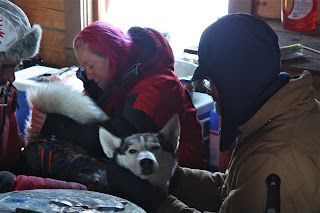
As he comes back in for a last hot meal and cup of coffee, we have a chance to chat with DeBruin. Upon emerging from the icy cold he says “Thank God for hand warmers!” DeBruin has also run the Iditarod, so Wayne asks him how the two compare. “Trail wise, climate wise, this one’s a LOT tougher.” We ask him how he’d feel about being the last one across the finish line in Fairbanks. “I get accused a lot of smelling too many roses,” he replies, “but why the hell would you come all the way out here to do this and not let yourself enjoy it?”
I agree, Hank. It is a race after all, but it’s nice to know that there are folks in it who take the time to appreciate all of the extraordinary sights and things they are experiencing, and recognize that they are one of a handful of people in the world who will ever be seeing and feeling what they are living through at that moment. The last few days several mushers have talked about their amazement at the Northern Lights, or their dogs’ enthusiasm, or the fact that they lived through the weather they just encountered on the summit, etc.
Epic stuff.
We see DeBruin off at 12:30, and take a group photo in front of the cabin.
Jen Rafaelli has been looking a little green around the gills, and confirmed that she wasn’t feeling well today. I guess she’s the next victim of the bug that bit me. Sorry, Jen. She and Michael head up to the PUC to get some rest, since they are off shift now and have been up for around 20 hours at this point.
Lou radios to us to tell us that the Quest office says that Wayne and Mercedes will not be flying out today, either, so Mercedes goes upstairs to unpack her sleeping bag, because it takes a while to fluff back up once it’s compressed.
We had some visitors on snowmachines today. The trail crew stopped by, two fellas, whose names I didn’t get. They follow a couple of hours behind the red lantern to collect trail markers and anything race-related that got accidentally left behind by the mushers (like dog booties - we found a dozen or so around the roadhouse in the snow after mushers left). The photo below shows some signs that trail breakers had put up along the way for the mushers’ amusement, to brighten up some of the longer stretches. The two clean-up dudes brought them in for the trash (a couple at a time), but before we fed them to the woodstove, we had fun reading them and trying to put them in order so they made sense.
One of the mushers laughed at a similar sign he saw with an arrow pointing to a tree that said “Pee here.”
Just when they had gotten comfortable, the Quest pilot radios in that he is a few minutes out from coming to pick up Wayne and Mercedes, one at a time. Pat radios to let Lou know that the pilot didn’t get the memo from the Quest office that he wouldn’t be fetching them today because he is about to land. Wayne goes first, because Mercedes now has to deal with that fluffy sleeping bag again! The pilot tells her, “If I’m not back by 5:30 pm, I won’t be back today.” Nothing like hurry-up-and-wait.
The pilot comes back at about 5:29, and Mercedes heads down the hill to the river to meet him. They have just enough daylight left to get to Circle City. I was sad to say goodbye to Wayne and Mercedes, but hopefully I’ll get to see them again.
Now, all we have to do is clean up and pack up, but we can’t do that until we hear for sure that the plane is coming to get us tomorrow, because we still need the supplies for ourselves as long as we’re here. Also there’s a slight chance that a musher could turn back and show up again, so we’re all prepared for that as well until they’ve all reached the checkpoint in Circle. So it’s a relaxing evening, and Pat declares that for dinner tonight “it’s every man and woman for their self!”
We warm up some spaghetti and everyone (except poor Jen) enjoys a rare sit down meal together. Pat tells us to be back down around 8 am, and we’ll see what the weather is doing and go from there. Eva moves down to the roadhouse, since everyone is sleeping during the night for the first time, and there are only four bunks at the PUC. One more trip to the frozen outhouse, and it’s hello sleeping bag.



